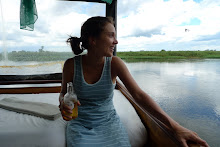You Can't Have Breakfast with Oprah Winfrey
Last night, Tory (the Peace Corps girl living here in Kachikau) and I went over to Ramolele’s house, and had a glass of wine with a couple of the secondary school teachers. On Sundays, they often sit under a tree in someone’s yard, drinking beer/wine, listening to jazz and talking politics. I’ve had a couple of interesting sessions listening to them debate, about everything from Obama winning the Nobel Peace prize (which embarrassingly they had to inform me of—I had not read a paper in a while…) to Mugabe’s antics in neighboring Zimbabwe. Yesterday evening, the conversation turned to the tourism industry here in the Chobe area. The common conundrum came up—on the one hand, tourism brings in a lot of money to central government, but on the other hand, local people don’t benefit all that much, and on top of that, most Batswana can’t afford to even see their own parks and reserves. Botswana’s “high end low volume” policy means that only the richest of the rich can take a vacation to see Chobe’s plethora of wildlife and natural beauty. While self-drive camping is always an option, if you want to stay in proper lodgings (either for comfort or lack of camping equipment), then you’re looking at a cool $1,000 a night. John suggested that the high-end low volume policy came partly out of a recognition that foreign tourists don’t want to see lots of people around while they are enjoying their catered breakfast in the bush—they want to see wildlife. And honestly, in my experience, this is pretty true. Camps and lodges cater to the myth of wild Africa, and tourists pay top dollar for it. Safari-goers in Botwana often boast that in a whole day they didn’t see any other people, unlike in Tanzania or Kenya where ten game drive vehicles may crowd around a lion kill. As Ramolele put it, if Oprah Winfrey is sitting down to her luxury camp breakfast, then I can’t just pull up a chair and join her. We all laughed but I couldn’t help but think back to something Tory had pointed out—that really there are two myths or images of Africa—one of starving needy people and the other of pristine wildlife-filled savannahs. And the two tend to stay separated in outsiders’ minds. Either Oprah is starting a school for underprivileged girls in South Africa or she is on safari on the lookout for elephants, insulated from a human-filled landscape. But then where does somewhere like the Chobe Enclave fit, where you find puff adders in the back yard, fathers and sons fishing for dinner in the picture-perfect river channels, and schoolteachers who just want an affordable way to cruise around the park on a weekend off?



